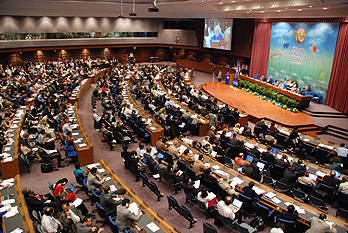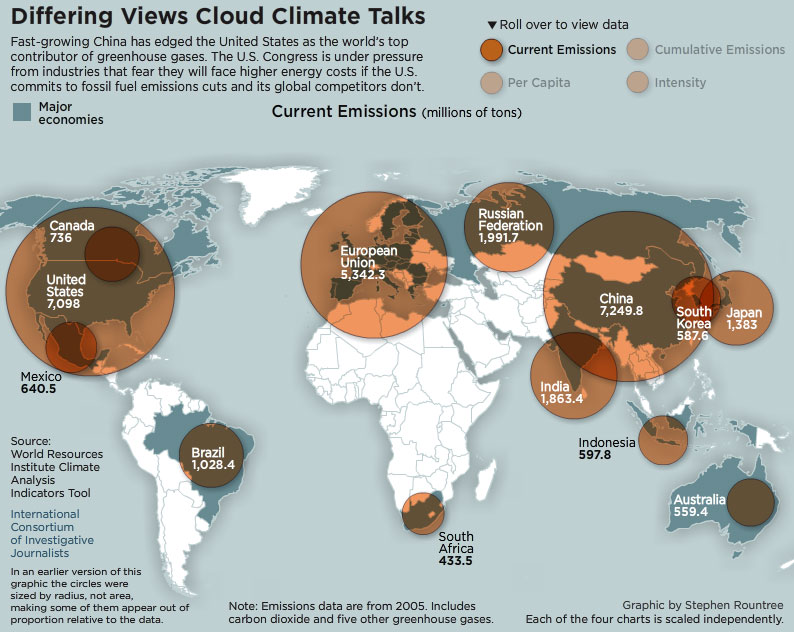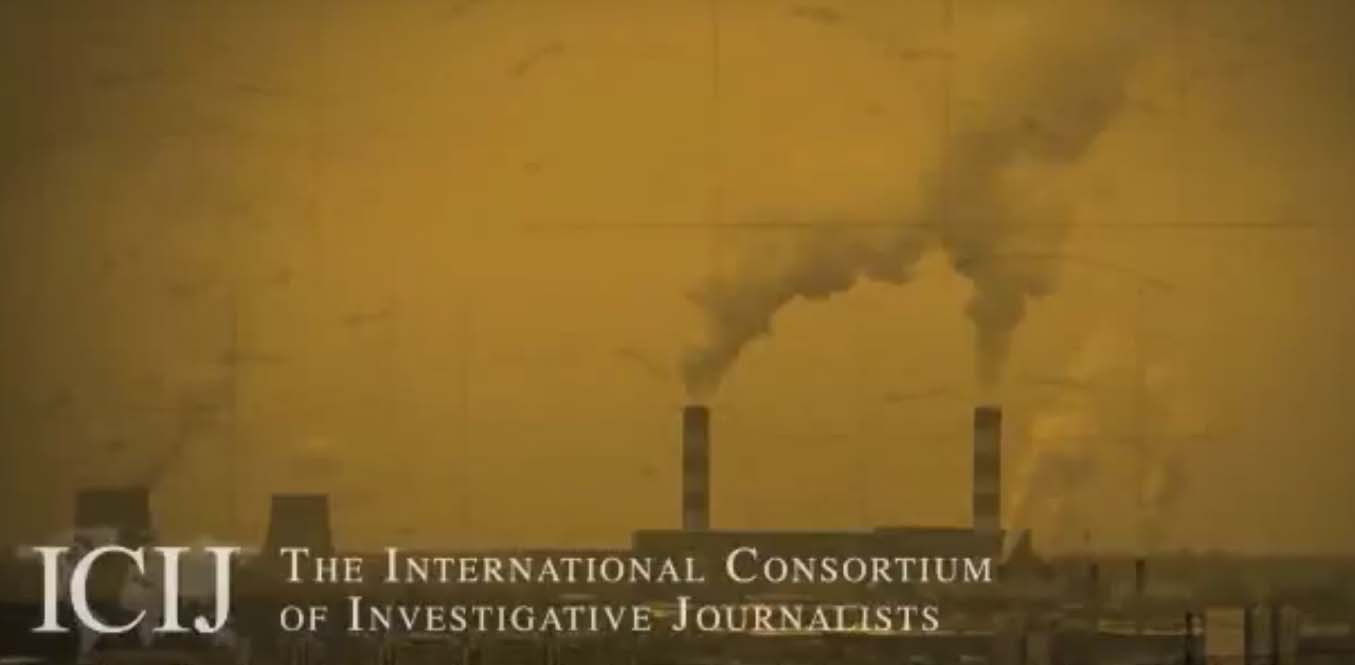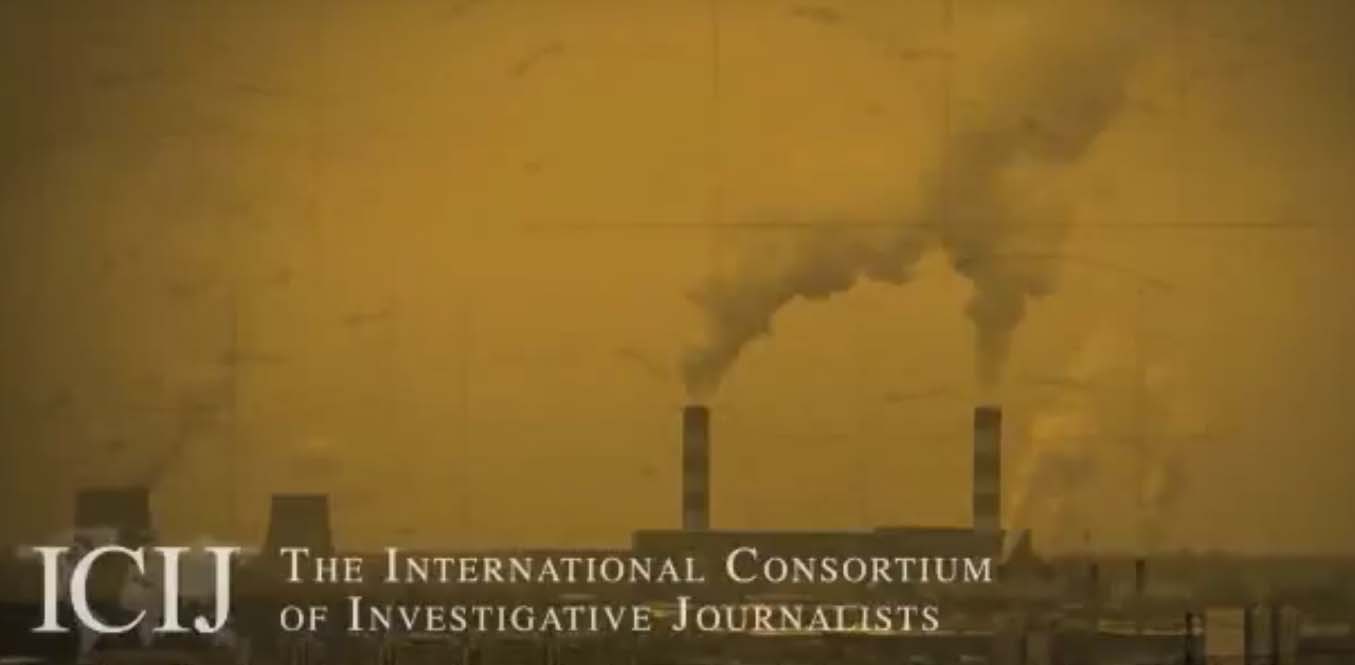Bangkok — Protesters drenched by an October downpour gathered outside Bangkok’s United Nations Conference Center recently, shouting through bullhorns and denouncing countries for the weak commitments they’ve shown in negotiating a treaty to curb greenhouse gases. Inside, the atmosphere was more businesslike: professionals lingering around coffee bars, smiling at familiar faces, and grasping hands in recognition. Later, they would meet behind closed doors in a conclave dominated by representatives of the world’s top energy companies.
Welcome to the world of “BINGOs” — Business and Industry Non-Governmental Organizations that have long played a key role in shaping the global debate on climate change. Industry groups are operating under United Nations rules that exclude individual corporations from attending the climate summit, instead requiring businesses to join associations to represent them. The Bangkok talks were one of several sessions leading up to the formal negotiations, starting in Copenhagen on Dec. 7, aimed at producing a new global treaty limiting carbon emissions.
Here at the conference center, several dozen BINGO executives gathered to debrief each other on such high-stakes matters as global targets for emissions reduction, the number of carbon offsets, and timetables for implementation. But while the agenda of the BINGOs on climate change seems clear, their strategy is harder to discern. And the results of their efforts are often intangible. In other words, this is not lobbying as it is commonly understood. “What we do here is we loiter,” says John Scowcroft of the European Union of the Electricity Industry. “It’s loitering with intent.”
Think Global, Lobby Local
In Bangkok, the debriefing sessions were led by a gray-bearded, bespectacled British lobbyist named Nick Campbell, a chemist and lobbyist for French chemical company Arkema, who also represents thousands of companies for the International Chamber of Commerce. Campbell has been attending the U.N. climate talks since 1991, but he says he saves his actual lobbying for the national and regional level, including at the European Union in Brussels. “As a BINGO, you can have very little effect at these meetings,” he explains. “The only way you really get leverage is if you can convince a delegation at home that it’s in their interest to have their instructions say this or that.”
Instead, Campbell comes to the climate talks to network — to shake hands, renew acquaintances, drink coffee, and exchange business cards. He knows the contacts he makes will serve his lobbying efforts elsewhere. As do other BINGO representatives, he hopes his current efforts will result in some influence over any treaty text agreed upon in Copenhagen.
Executives of carbon-intensive industries once denied that their emissions contributed to climate change, and some fought for years against a global agreement to curb emissions. But as the scientific consensus hardened, and as government and public opinion turned, business began to shift its approach. Following passage of the 1997 Kyoto Protocol, the world’s first treaty limiting carbon emissions, industry groups began to accept the growing body of evidence on warming and clambered to make their voices heard. “Not a lot of companies still lobby openly against regulation,” says Irja Vormedal, a research fellow at the University of Oslo, who studies industry influence in climate negotiations. “That ship has left the dock. Now they try to prepare for this new transition. They say, ‘If we do that, we’ll have a chair at the table and can influence regulation.’”
A New Strategy: Go Slow
At the heart of Big Carbon’s current strategy, say industry delegates, is admitting that emissions controls are needed. While conceding the need to de-carbonize, industry representatives have prevailed on national governments and delegations to the U.N. to use language that would slow implementation of the resulting accord. Many carbon-intensive business associations — among them coal, oil, and electric companies — seek long-term emission reduction targets instead of near-term goals. They want governments to provide, free of charge, plentiful allocations of the allowances they’ll need to discharge carbon under the treaty. And they want as much leeway as possible to “offset” emissions instead of reducing them, through investments in lower-cost projects in developing countries such as reforestation. They also are pushing for the U.N. to include as one of those approved offsets any investments they make in the still-nascent technology known as carbon capture and storage — a controversial process in which carbon emissions (largely from coal plants) would be trapped and stored underground. And they lobby for all these concessions as necessary, given the disadvantages they say they will face so long as the climate treaty continues to operate as it has in the past — with developing countries like China and India under no obligations to cap their emissions.
When it comes to climate change, the international business lobby is not monolithic. A new industry voice has emerged over the past few years in the form of associations of wind and solar industries, and of financial companies eager to profit off of emerging carbon markets. Their agenda differs sharply from that of traditional energy industries. “The renewable energy companies and the financial investors were suddenly much more vocal,” says Vormedal. “They put together a platform of interest groups lobbying for more regulation, advocating for more stringent targets for developed countries.”
But some new industry voices say they are overshadowed by the veteran network of heavy industry representatives, their Rolodexes crammed with 20 years’ worth of business cards and their faces familiar to government officials around the world. Indeed, with more people and deeper ties, members of carbon-intensive industries largely dominated the international business lobby in the morning meetings at Bangkok.
One old industry hand is Brian Flannery, the climate guru for energy giant Exxon Mobil and, along with Campbell, a representative of the International Chamber of Commerce. Environmentalists have long cast Flannery as one of the worst climate-change deniers. Exxon Mobil was indeed one of the last of big businesses to grudgingly accept, at least publicly, the science behind climate change. But Flannery’s position is actually more nuanced than what activist groups often report; he conceded as early as 1991 that human-induced carbon emissions contribute to climate change, while tempering his acceptance by saying there wasn’t enough information to determine how significant a role humans have played. “To date, direct observations cannot distinguish possible changes induced by human forcing against a backdrop of little-understood, large, natural climate fluctuations,” he wrote in 1991. Flannery has also co-authored reports by the Intergovernmental Panel on Climate Change — a process by which scientists try to come to a consensus on climate change science then submit the results to sponsoring governments.
Flannery’s argument today remains largely the same, as does his pessimism about prospects for a global agreement. “The only way to get to these low levels is for the whole world to act together with common targets and a common carbon price,” he now says, while arguing that such an approach is unrealistic. “We’re not going to have everyone with the same target, the same price on carbon… It does raise fundamental questions about whether the negotiating process should aspire to unachievable targets and work in an area of confrontation and dismay, or try to work towards achievable targets.”
Remi Gruet of the European Wind Energy Association — which supports more ambitious targets — says Flannery’s stance is a predictable go-slow corporate approach. “The usual industry you will find in the BINGO groups are the oil and gas industry, the chemical industry,” Gruet said. “Anybody who doesn’t want to have their emissions reduced has been coming to this process to try to disrupt it ever since the beginning.” Thus, Gruet says, the alternative energy industry has to look elsewhere for allies, to the growing number of companies pushing for an international carbon market — a global exchange that trades in renewable technology and carbon-reducing projects such as reforestation. “They’re the only one we can really have a common interest with,” Gruet says. “They’re interested in having a bigger carbon market, a stable price of carbon. So we have common ground.”
Among the priorities of the old-line industries is securing more time to cut emissions. “The bottom line is time,” said John Novak, of the U.S.-based Electric Power Research Institute, who argues that regulators cannot “force a reduction faster than technology can support.” A country cannot replace heavy use of coal with cleaner natural gas if natural gas resources are limited, he says.
The European Union of Electricity Industry (Eurelectric) also wants 30 more years to hit the carbon limits proposed by the U.N. “We would argue the focus on 2020 is wrong for us as a power industry,” says Eurelectric’s John Scowcroft. “We have to reduce our emissions; it’s just a question of speed.”
How then, does a business — or an entire industry — convince a government delegation to adopt its position? It’s not about campaign contributions and office visits, as it is on a national level. “It’s a combination of sitting down with delegates or legislators, organizing presentations for groups of them or their staff,” explains David Hone, climate advisor for Royal Dutch Shell, now the world’s largest publicly-traded oil company. But the most direct results come from lobbying on the national level, he said. For instance, the Brazilian government doesn’t want carbon capture and storage approved as an “offset” because the country isn’t implementing the technology. Shell does want it approved. “So we have put some effort into talking with the Brazilian government to understand their concerns and see if there’s a way around that,” says Hone.
Hone doesn’t lobby at the international climate negotiations, he says. He says he listens — trying to understand delegates’ concerns — in this case Brazil’s. Then he alerts representatives of Shell’s Brazilian subsidiary, who can use the information as they lobby the national government. “Talking to the delegates opens doors for people back in Shell Brazil, who may then go and have a follow-up conversation.”
Handshakes and Heartburn
Exxon Mobil’s Flannery says anyone who comes to the international talks in hopes of wooing a delegation is “just going to get heartburn… This isn’t a place for lobbying. All the industry associations recognize their key issue is to work at home, with their governments, in their capitals.” The U.N. talks are strictly for networking, he notes. “You form contacts all over the world, people you know who will answer the phone because they respect you. To me, that’s tremendously valuable to be able to discuss.”
“The great thing about these meetings is you have ministers and secretaries of state who have nothing to do,” adds Eurelectric’s Scowcroft. “So they sit around in coffee bars.” Scowcroft says he once took his Dutch boss to a meeting. “He met the Dutch environment minister within five minutes of walking in and registering, and spent an hour and a half with him. He walked out and said, ‘You just justified my visit here.’”
Campbell, of the International Chamber, says he has tried to convince other colleagues to attend the negotiations, impressing upon them the intangible rewards of the coffee bar.
“The advantage of coming to these meetings — as I’ve spent years trying to tell my colleagues — and I may as well talk to a brick wall over there — is that you have more opportunity talking to delegates at these meetings than you do at home,” he says. “You have the coffee bar; they’re off-line. You might be staying at the same hotels as people.” But while he might discuss business in passing, Campbell tends to keep it light. “You can destroy your welcome very easy at these processes by being too pushy,” he explains. “One of the delegates sat with me at breakfast. We didn’t talk about work purely on the grounds that the last thing she wants to talk about to some idiot from industry is work over breakfast.”
The reward for a career of schmoozing comes in nuanced changes to the treaty text and delegation requests for industry input, industry veterans say. Campbell describes a recent request by a U.N. expert panel seeking input from the Chamber. “So we’ve actually been invited to be at the table,” he says. Whether those kinds of results come from being on scene Campbell can’t say. But, he notes, “The Bali action plan [the 2007 plan which set the course for later talks] mentions participation of the private sector. Back a number of years ago, you would never have had governments state that business should be part of the solution. So that was a big positive.”
Years of negotiation will culminate in the final session in Copenhagen. Whether an accord will be ratified is still unclear. But even if an agreement is signed, it will likely be vague and open to interpretation, experts say, exposing the process to further influence by businesses with a stake in the outcome. “One thing we can say for sure is that there’s going to be two more years of detailed nuts and bolts to work out,” observes Doug Russell, a former delegate from Canada turned private consultant. And that will be the next big battle, he says. “That’s where the real interest will pick up. It’s in those details that business will become very active to make sure the rules are written in such a way that favors what they’re going to want to try to do.”



